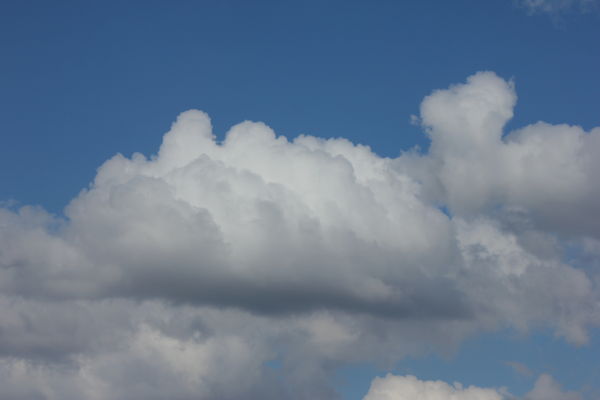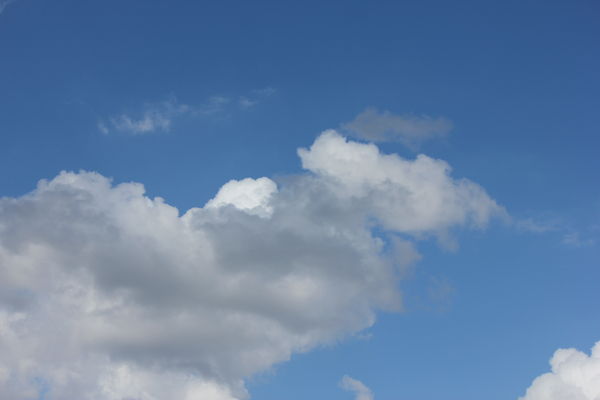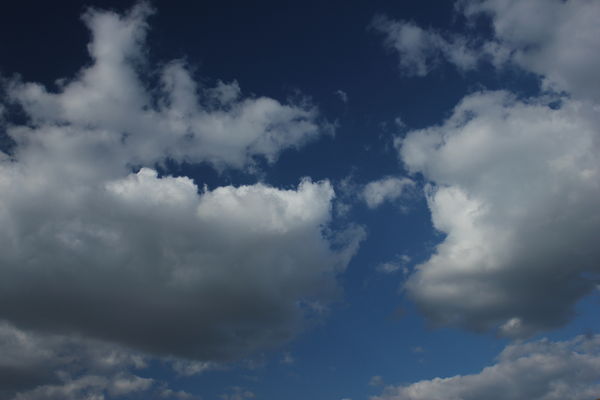Fliter question
Apr 5, 2012 18:49:39 #
I was trying to take some cloud pictures with a CPF. As I understand they work best when 90 degrees to the light. I rotated the outer filter untill I thought the ski was slightly darker,however the ski goes from darker to lighter from the upper left to the lower right .Am I not seeing the light correctly or is this normal. Any help is welcome.



Apr 5, 2012 19:11:30 #
Apr 5, 2012 19:53:39 #
Canon kit lens EF-S 18-55 zoom 1:3.5-5.6 IS I hope I put the pictures in properly so you could look at all the photo info. NO comments about the Canon--I think it's the shooter not the camera.
Apr 5, 2012 20:06:48 #
I was just wondering as the kind of color gradation you are getting is fairly typical of a CP when used on a wide angle lens. You shouldn't be getting this if you were shooting at the 55mm end of that lens, but probably will at the 18mm end. This variation in effect is a CP trait and seldom occurs with the older Linear Polarizers, but they are now compatible with your AF and many metering modes. They can still be used in full manual operation with quite pleasant effects.
As an example of what I am saying; Lets say you are at 90 degrees to the sun with the sun directly to your right. You are using a wide angle lens with a 90 degree field of view. The effective sun angle on the right side of your lens will be only 45 degrees, while the effective angle on the left side of the lens will be 135 degrees. This will definitely effect the gradation and the degree of polarization you achieve from one side of the lens to the other.
Make sense?
As an example of what I am saying; Lets say you are at 90 degrees to the sun with the sun directly to your right. You are using a wide angle lens with a 90 degree field of view. The effective sun angle on the right side of your lens will be only 45 degrees, while the effective angle on the left side of the lens will be 135 degrees. This will definitely effect the gradation and the degree of polarization you achieve from one side of the lens to the other.
Make sense?
Apr 5, 2012 20:50:06 #
yes it does make sense. How or what do I do to correct this,do I need to shoot with a longer lens or can I correct the proble by turning the filter more or a combo of both. I am still trying to master this camera, I have a folder of experments. You should see some of the Bo-Bos I have in there,man you would be holding your sides with laughter cuse I done made some good ones.
Apr 5, 2012 21:07:23 #
I have always had the best results with a CP in the 70-150mm range. Your pics above are not bad. But the gradation is noticeable. First you have to ask "Do I NEED a CP on this shot?" I personally feel they get overused by many, but there are definitely times when nothing else will give you the sky you want. Also, when stacked on top of a quality UV filter, the UV tends to lessen the gradation a little bit.
Nothing will help you more than experimentation. Different lenses as well as different sensors will exhibit different results. Also, the better quality the CP, typically the better the results you will see. I have seen some cheap Chinese CP's that produce HORRID effects. (Many are just polarizing film glued to cheap glass. The worst I ever say was a $12 Sonia brand). But I saw one unbranded CP that amazed me with the range of polarization it achieved!
Nothing will help you more than experimentation. Different lenses as well as different sensors will exhibit different results. Also, the better quality the CP, typically the better the results you will see. I have seen some cheap Chinese CP's that produce HORRID effects. (Many are just polarizing film glued to cheap glass. The worst I ever say was a $12 Sonia brand). But I saw one unbranded CP that amazed me with the range of polarization it achieved!
Apr 5, 2012 21:31:32 #
This is a Promaster filter from a local camera store. The people are good to deal with and thought this would be a good fit. I did get a 55-250 zoom with the kit and have purchased a Tamron 200-500 zoom in hopes that they would cover the range I would most likely be shooting. I will do some more shooting with the other lenses and compair the results. Like I said I am just trying to see "what happens when I do this" that is the way I learn things. This one just threw me because I have never used a polarizer filter before. Oh,yes,I did remove the haze filter while using the CPF. Thank you for your input Shooter, It is very helpfull.
Apr 6, 2012 14:31:09 #
Shoot all the combinations you want, but there is no way to shoot around laws of physics. Expanding on what MT Shooter wrote, light in polarized by atmospheric moisture. This is most apparent with light at 90° and the filter is 90° to the polarized light. So, a wider view must have varying degrees of polarized light across the sky while the filter will darken those rays closest to 90° and lesser as the image captures more and less degrees in the polarized gradient.
Thus a long lens captures a narrow angle piece of thar gradient so we thing the polarize filter is working better. It is not. The effect of the filter is exactly the same as in a clip of the same section from a wide angle capture.
A more effective filter, i.e. straight linear, is 'stronger' but the gradient is still there - just harder to see. On a clear day shoot a 180* panorama any camera, any lens, any filter. Stitch them and see the gradient. Inescapable. Well not entirely, if you photograph from about 65,000 feet and above you won't need a polarizing filter at all.
Thus a long lens captures a narrow angle piece of thar gradient so we thing the polarize filter is working better. It is not. The effect of the filter is exactly the same as in a clip of the same section from a wide angle capture.
A more effective filter, i.e. straight linear, is 'stronger' but the gradient is still there - just harder to see. On a clear day shoot a 180* panorama any camera, any lens, any filter. Stitch them and see the gradient. Inescapable. Well not entirely, if you photograph from about 65,000 feet and above you won't need a polarizing filter at all.
Apr 6, 2012 16:10:55 #
R Dubs wrote:
I was trying to take some cloud pictures with a CPF. As I understand they work best when 90 degrees to the light. I rotated the outer filter untill I thought the ski was slightly darker,however the ski goes from darker to lighter from the upper left to the lower right .Am I not seeing the light correctly or is this normal. Any help is welcome.
Maybe it was just the way the sky was naturally, darker in one area then the other. 8-)
Apr 6, 2012 17:50:22 #
I was looking at photos in another section of the UHH with a similar topic and the photos there also had a darked to lighter sky when using a CP filter and wide lens. I understand that a longer lens will basicly have the same effect as croping the photo. This is all expermintation and I amlearning from it and from all the advice I get from the UHH. Unfortinatuly Lincoln is only about 1300 ft elevation so I will get the gradient effect and now I don't think it is as bad as orrignaly thought. Thank you all for your input.
Apr 7, 2012 01:22:09 #
I have seen the same problem with polarizers and as pfredd said, you cannot defy the laws of physics. Since you cannot avoid the problem, the question becomes what to do about it. One, fix it in PS. Two, do not use the polarizer and just create the effect in PS. In other words, you are back to PS. Three, graduated neutral density filters. I plan to try these this summer. They will not cut thru reflections off of leaves and foreground but I would think they would give an even sky.
Feedback anyone?
Feedback anyone?
Apr 7, 2012 13:18:56 #
abc1234 wrote:
I have seen the same problem with polarizers and a... (show quote)
Depends on what the intended results are. If the OP is looking for a dark blue sky contrasted with white clouds, AND a CP is avoided for the inevitable gradation in the sky, I don't see where NDs would get this intended result. I would try this on manual exposure: start with a sunny-16 exposure and then check the histogram. Adjust to expose for the white clouds (expose to the right). Adjust the exposure levels for the clouds and the sky separately in PP, until you get the intended results.
Apr 7, 2012 15:54:18 #
Please go back and read my question. Am I not seeing the light correctly, or is this normal? The answer is__ "this is normal". I do very little in PP at this time. I am thinking of taking a class to learn Elements 10 for future use. I will then also shoot in RAW and will be able to correct this problem. Thank you for the assistance.
Apr 7, 2012 17:03:59 #
R Dubs wrote:
Please go back and read my question. Am I not seeing the light correctly, or is this normal? The answer is__ "this is normal". I do very little in PP at this time. I am thinking of taking a class to learn Elements 10 for future use. I will then also shoot in RAW and will be able to correct this problem. Thank you for the assistance.
The E-10 class will open lots of possibilities, but be advised before you go crazy, it is neigh impossible to duplicate the effect of a polarizing filter. It can be somewhat faked with masking and gradients for the sky, and not at all for water. IMO, use the filter, PS the effect out if you don't like it.
Apr 7, 2012 17:55:51 #
pfredd I know PP has its limitations and that is why I am trying to take better pictures. I am a novis at DSLR that is why the beginner questions. Everyone here at UHH has been informative and honest. I know if I ask for CC it will be honest and without mallice, even if it isn't what I want to here it makes me a better picture taker and I am gratefull for the assistance from all tht people at UHH.
If you want to reply, then register here. Registration is free and your account is created instantly, so you can post right away.



